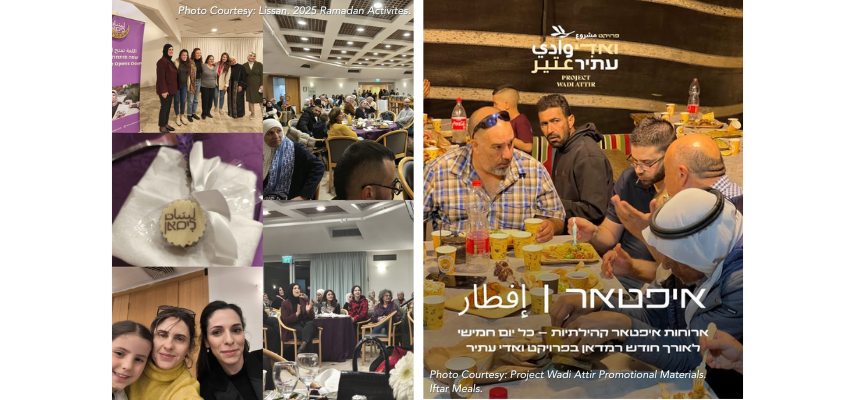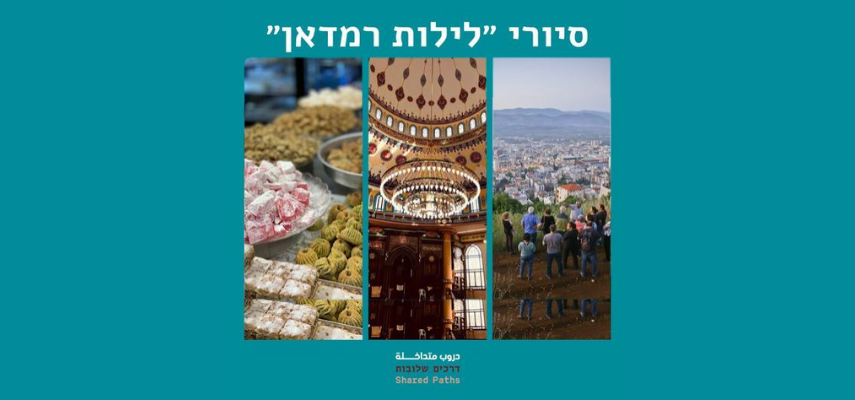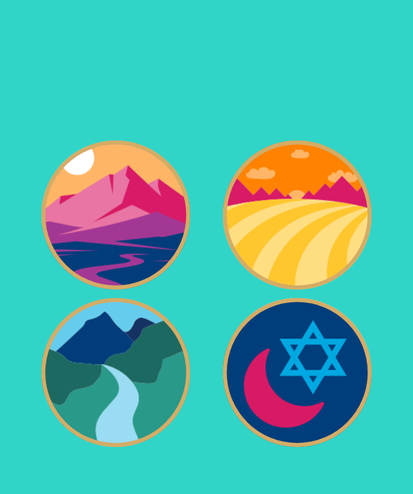Second Ramadan in Israel in the Shadow of the War

The holy month of Ramadan began this year on February 28 and lasted through March 29. In recent years, Ramadan in Israel has been characterized by two opposing trends: increasingly, as a focal point for shared society efforts, featuring inter-cultural tours, night-markets, Jewish-Arab Iftar meals and joint activities. In public and political discourse, however, it is most often emphasized as a national security issue, particularly around access to the Al-Aqsa Mosque in East Jerusalem, where large numbers of Muslim worshippers from Israel and the West Bank go for prayers. Following the ceasefire’s collapse on March 17th, there are growing fears that extremists may exploit the situation, leading to clashes between worshippers and security forces, though thus far, the holiday has passed in relative quiet
Nonetheless, Samah Salima writes, “this year’s Ramadan is especially dark, frightening, and sad for most Palestinians—in Gaza, the West Bank, and among Palestinian citizens in Israel.” With war dominating the news and travel to and from West Bank restricted, the holiday feels particularly somber in Arab communities. Subdued decorations across the country reflect both mourning and compassion.
The ongoing crisis of violent crime within Arab society, meanwhile, adds to the weight and worry. Since the start of Ramadan, seven homicides have brought the total number of victims this year to 56.
Economic Cost
In normal times, Ramadan is more than a celebration of joy, culture, and tradition—it also carries significant economic importance. Increased spending throughout the month puts pressure on credit limits and drives a rise in small bank loans, while businesses in Arab society enjoy their most profitable season. However, the ongoing war has dealt a severe economic blow, with employment rates declining and business revenues falling in Arab localities.
In recent years, shared society initiatives during Ramadan—such as intercultural tours, night markets, and Jewish-Arab Iftar meals—have fostered connection beyond security concerns. However, since the war began, these efforts have been more restrained. With tensions high and public focus on security, participation remains cautious, and many programs have shifted from celebration to resilience and support.
Explainer: Al Aqsa Mosque and Ramadan
During Ramadan, Muslims worldwide observe fasting, family and communal gatherings, and religious practices with heightened devotion. It is one of the most anticipated holidays traditionally dedicated to prayers, good deeds, and community-wide celebrations. Muslims consider it a great honor and religious duty to visit holy sites during Ramadan. Many religious groups organize trips to Al-Aqsa Mosque—from within Israel, from East Jerusalem, and the West Bank—with special emphasis on Friday prayers.
Al-Aqsa Mosque / Temple Mount
The Al-Aqsa Mosque on the Temple Mount/ Haram Al-Sharif, the third holiest site in Islam, is managed by the Waqf since the 1967 War. In this arrangement intended to maintain calm, Muslim prayer is allowed but Jewish religious practices on the premises are not. The site is sacred to both Arabs and Jews.
In recent years, the site has become a trigger point in Jewish-Arab and Jewish-Muslim relations, in part due to an increase in the number of religious and national Jewish groups, collectively called the Temple movement, encouraging Jews to visit and pray at the site. At the same time, the large number of Muslim worshippers coming to East Jerusalem requires additional security.
The approach becomes increasingly complicated as large-scale deployments necessitated not only by genuine security concerns, but by the perception of Muslims as a security threat due to political discourse. Challenges to the status quo and clashes at Al-Aqsa reverberate throughout the Muslim world and streets of Israel, increasing tension in Jewish-Arab relations.
Concerns over Heightened Security Measures
Ramadan in Israel sees hundreds of thousands of Muslim worshippers, Israeli and Palestinian citizens, gathering at sensitive sites in Jerusalem, particularly at Damascus Gate and Al-Aqsa Mosque on the Temple Mount. Security management is especially complex due to the high turnout and risk of provocations escalating into violence. The ceasefire’s collapse has heightened tensions, with extremists on both sides potentially exploiting the situation to escalate conflict in Jerusalem and the West Bank.
Israeli security sources suggest that the overall stability of Ramadan this year will depend largely on developments in Gaza: “The explosiveness of the Ramadan holiday will depend mainly on the situation that develops in the Gaza Strip. If there is a ceasefire, then they estimate that the situation will be calm, and if not, then they will prepare with much larger forces for fear of escalation.”
To manage the situation, significant security measures have been put in place. Approximately 3,000 police and Border Guard officers have been deployed throughout Jerusalem, focusing on perimeter checkpoints, the Old City, and East Jerusalem neighborhoods. Traffic restrictions are also in effect, with key roads near the Old City closed from 6:00 AM to 3:30 PM for private vehicles.
Restrictions on Al-Aqsa access and increased numbers of security forces remain a particularly sensitive issue, often seen as collective punishment. On March 6th, the Prime Minister’s Office announced that entry to Al-Aqsa for West Bank residents would be subject to individual permits and preliminary security assessments. While these measures are slightly more lenient than last year, they still mark a sharp departure from pre-war years, with significantly fewer worshippers allowed access.
Currently, only 10,000 permits have been issued for West Bank residents, with strict age restrictions—men over 55, women over 50, and children under 12 allowed entry, and only for afternoon prayers. This represents a significant tightening of policies compared to previous years. The Israel Police statement stressed that there are no entry limits for Arab citizens of Israel.
Despite that, restricted movement also affects Arab communities in Israel, limiting their ability to visit family and shop in the West Bank. Shirin, a mother of five from Lod, describes the hardship: “It’s not just that a Ramadan basket costs less in Nablus than in Lod—this year, instead of 2,500 shekels, it will cost us at least 4,000 shekels. But what really hurts me is that I can’t visit my family. Ramadan is about closeness, and I won’t get to hug my elderly mother. Maybe this is her last Ramadan with us? Why is this little joy, once a year, also forbidden?”
Local Shared Ramadan Activities
Ramadan is often a dynamic month for shared society organizations and municipalities in mixed cities, for whom joint efforts between Arabs and Jews mark unity and partnership. These activities include cultural meetings, joint Iftar dinners, tours and workshops.
Traditionally, neighborhoods are decorated, youth events, and Ramadan markets are held. However, this year, some events have been scaled back or adjusted for safety and expressing solidarity. Despite this, shared society organizations and municipalities are finding ways to promote unity, through smaller gatherings, virtual events, and community-led initiatives, reinforcing coexistence, resilience, and mutual respect.
Holiday Explainers and Best Practices
Several civil society organizations, including aChord, have shared introductory information about Ramadan, along with recommendations on “what to do and what not to do” when interacting with Muslim colleagues and neighbors during this time in a sensitive and respectful way. Many civil society organizations in Israel have taken to social media to share explainers about Ramadan in Hebrew and English, fostering greater understanding of this important month for Muslims. By providing accessible information, organizations contribute to a more informed public, encouraging respect for religious traditions and the diverse fabric of Israeli society.
Tours

Drachim Shluvot (Shared Paths) program by Merchavim offers immersive Ramadan tours in Kafr Qassem, Taibeh, Jaljulya, Jaffa, Kfar Bara, Tirah, and other localities. Participants visit a mosque, explore lively food markets, and witness the powerful moment of sunset and the breaking of the fast. The experience concludes with a shared Iftar meal in a local home, fostering meaningful conversations with the hosts.
The Sharon Regional Cluster held its annual Ramadan Nights event with Drachim Shluvot, bringing together Jewish and Arab mayors and CEOs in Jaljulia. The evening began with the planting of the Tree of Shared Life along the new promenade, symbolizing coexistence. Cluster Chair Rafi Sa’ar and Jaljulia Mayor Darwish Rabi led the ceremony, joined by other mayors. Attendees then took part in a guided tour on Islam and Ramadan traditions at the village mosque, followed by a communal Iftar meal.
The Ramadan Nights Tour on March 19th, held in Fureidis, was organized by the Daniel Centers for Progressive Judaism for International Day for the Elimination of Racial Discrimination. Participants explored initiatives promoting coexistence, joined a meeting, enjoyed a traditional Iftar, and experienced the town’s Ramadan atmosphere. The tour was specifically for members of Reform Jewish communities in Israel.
Community Iftar Meals
The Wadi Attir Project organizes weekly community Iftar meals throughout Ramadan. These gatherings provide an opportunity to experience the spirit of the month in a communal setting, enjoy traditional Bedouin dishes, and learn about the project’s work, which brings together tradition, community, and innovation.
The Interfaith Encounter Association continued this year with the traditional annual Iftar and Shabbat dinner in Jerusalem for Muslims, Christians, Jews, and Druze participants of ten of their interfaith dialogue groups in Israel. “In times of hardship, coming together in a spirit of understanding and shared humanity is more important than ever,” say the organizers.
Lissan, a grassroots nonprofit advancing gender and social equality in Jerusalem through Hebrew and Arabic education, hosted a community Iftar with over 200 women coming together to honor the Ramadan fast. Organizers reflected, “It was a joy to sit together and momentarily forget the world outside.”
Festivals
Hagar Association for Jewish-Arab Education for Equality organized special festivities for children, recognizing the unique overlap of Purim and Ramadan this year—a rare occurrence that won’t happen again for another 40 years. In Be’er Sheva, the bilingual school hosted the PurIftar festival, bringing together 350 community members for the event. Honoring both holidays, families gathered in the schoolyard, sharing a homemade Iftar meal while celebrating Purim traditions, including dressing up in costumes.
Solidarity Initiatives
Tag Meir, a grassroots coalition combating hate crimes and religious intolerance in Israel, brought together Jews, Muslims, and Christians to share in the spirit of generosity and unity. As Muslim worshippers broke their fast, volunteers distributed dates and water at colleges in Jerusalem, and in the Old City, expressing hopes for a month of peace, cooperation, and both personal and collective growth.
In the northern town of Basmat Tab’un, the bilingual Gil Bustan kindergarten organized a Purim celebration for children and distributed Mishloach Manot, Purim gift baskets, to Arab families in the surrounding neighborhoods to honor the festivited of months of Ramadan and Adar.
On Good Deeds Day, Education for Excellence students from centers in Jaffa and the Shibli village participated in community activities to honor Ramadan. In Jaffa, the students distributed over 400 dates, hand-packaged in Ramadan lantern-shaped boxes, to local residents. They also engaged in a quiz about the month of Ramadan and met the muezzin. In Shibli village, the high school students packaged gifts and wrote heartfelt Ramadan greetings, which were donated to the WMAN AHYAHA Association in Nazareth for orphaned children. The elementary school students also joined the initiative, delivering festive gifts and warm greetings to all the residents of Shibli.
In the Negev, Al-Sana High School and the Tamar Center, organized a Ramadan Charity Campaign to support families in the Negev. Initiated by students, the campaign involved packing and distributing food parcels, each accompanied by a handwritten message with Ramadan greetings. Alongside this effort, students also participated in the “We Plant Goodness, Hope, and Flowers” initiative, planting trees and flowers while decorating classrooms to create a more welcoming school environment.
Workshops
The Wadi Attir Project offers a cooking workshop to prepare Katayef, a traditional Ramadan dessert with a Purim twist inspired by Hamentashen. The activity highlights how food connects cultures and emphasizes community, sustainability, and shared traditions.
The Jewish-Arab Center in Jaffa organizes community activities for both Ramadan and Purim. One of their workshops focuses on finding common themes between the two holidays, where participants create noise makers or drums that can be used for both celebrations. During Ramadan, a traditional custom involved a drummer walking the streets before dawn, using the sound of their drum to wake people for the pre-dawn meal, suhoor.
How Can We Help?
Do you need support integrating these resources and issues into your philanthropic, communal, or Israel education work? Reach out for consultations, connections to experts, program support, training, or to plan your next event or mission. If you’ve used our resources, tell us about your experience!

